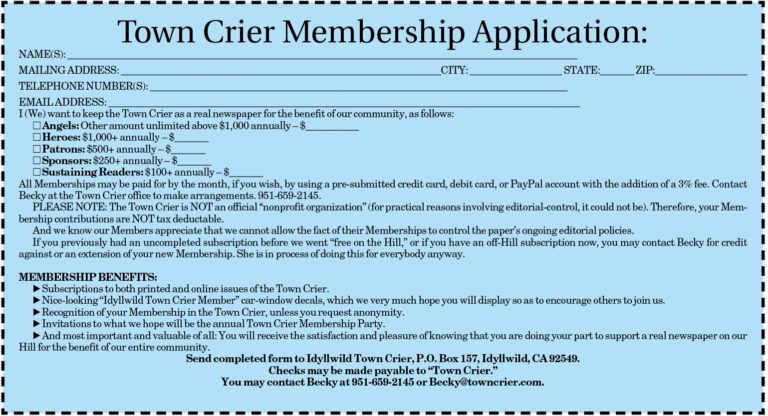The discussion, debate and controversy over short-term rentals (STRs), especially in the Idyllwild and Pine Cove neighborhoods and the Wine Country, continues and will resurface this fall.
Riverside County’s contractor, Deckard Technologies of San Diego, began sending letters to owners and managers of STRs throughout the county. That was just the beginning of efforts to find acceptable solutions to this vexing problem for both the owners and their neighbors. The county’s Planning Department has begun a series of meetings with small groups of residents on the Hill and in the Wine Country to seek a common ground. These sessions began several weeks ago and will continue through spring and summer. The intent is to develop potential amendments to Ordinance 927.1 (Regulating Short Term Rentals) that can be presented to county supervisors before Sept. 9, which is when the current moratorium on new STR certificates for the Hill and the Wine Country expires.
Some feel that the recommended options will need to go to the board well before September to allow time for the Planning Commission and the board to review, discuss, and hear overall public comment and reactions.
In October 2022, when the moratorium was approved, Planning Director John Hildebrand told the board, “The next step moving forward will be for staff to continue working with those two communities to craft phase 2 amendments to the ordinance which would look at some kind of framework for those limitations on STRs and coming up with a density or a limitation of some kind and a mechanism for allowing new [STRs] when the threshold goes below that.”
Since these sessions have begun, the county said it still expects to have a report of the current STR status and of the stakeholder meetings for the board in April.
Deckard has been sending three types of letters to STR owners. The first and largest set went to permitted and legally operating STRs. Its purpose was to inform them of the new rules (such as off-street parking requirements and signage) and their need to comply with these.
The second group of letters went to STR owners outside of the moratorium area. who appear to be operating without a county STR certificate. The letter informed them of the need and how to comply with county code.
The third letter went to unpermitted or expired operations within one of the two moratorium areas. These letters directed the operators to cease operations.
According to Felisa Cardona, the public information office for the county’s Transportation and Land Management Agency, which includes the Planning Department, “… 103 letters were sent to unpermitted STR operators within the Idyllwild area.”
The next step for these operations will be Code Enforcement and Deckard follow up “… [to] ensure the unpermitted STR owners cease operations,” Cardona added.
A cease-and-desist order will be issued and if compliance is not voluntary, Cardona has said the county will pursue either an injunction or temporary restraining order through the courts to enforce the operation’s closure.
Some, perhaps many, STR owners have yet to receive any letter. Jon Brown, a member of the Idyllwild Vacation Rental Owners (VRO) group, said, “I haven’t received any notification and from our Idyllwild VRO group I’d estimate 80% haven’t received a single notice from the county about anything at all. The only thing anyone in the Idyllwild VRO group has actually received is a notice of inspection upon permit renewal.”
The lack of knowledge about the ordinance and owner responsibility is broader than many perceive, Brown stressed.
“There is this idea that ‘everyone knew’ they needed a permit because it gets talked about in FB [Facebook] groups, but the county never did any outreach of their own. None,” he explained. “So, we now get people joining the FB group who literally never knew they needed a permit to rent their cabin. Those folk should have been notified by the county and given the opportunity to get a permit before the moratorium went into effect.”
In the fall, at the two public meetings on STRs (one in each area), several issues were raised that will be topics during these smaller stakeholder meetings.
These include whether a cap on the number of STRs should be imposed, how to enforce it and how large it might be, whether a density limit, such as the distance between STRs, should be imposed, and how to calculate and enforce that, and several other issues.
These issues were the introduction to the stakeholder meetings. The top three issues Idyllwild community members identified were imposition of cap, some limitation with smaller areas and then an overall density limit.
When the group discusses the concept of a “density” limit, the conversation is likely to be contentious. At the October public meeting, many residents favored a limit of 10% of homes as STRs. But Cardona shared with the Town Crier, “There are approximately 485 county certified STRs in the greater Idyllwild area, as of March 15.. This represents about 12% usage of the area’s housing stock as STRs.”
If a 10% limit were set, it appears that some of the currently certified STRs might have to be shut down. And this raises the question of what criteria would be applied to make that decision.
The first Idyllwild meeting was a Zoom meeting, 4th District Supervisor V. Manuel Perez and some of his staff did participate in the discussion among stakeholders and county planning staff.
Neither Perez nor his staff would respond to questions about STRs.








